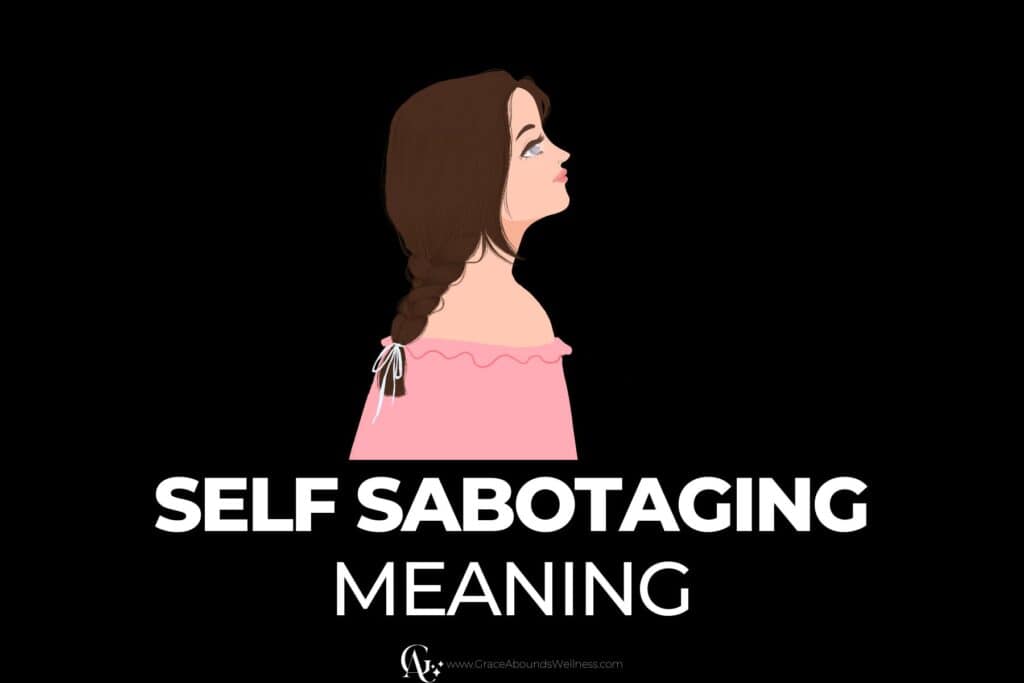Self Sabotaging Meaning, Signs, and How to Stop
This post is about teaching you the true self sabotaging meaning, its signs, and how to stop self-sabotaging as a Christian woman.
Heads up! This post may contain affiliate links, which means I get a small commission if you make a purchase — at no extra cost to you. I only recommend products I love and trust! Read my full disclosure here.

Have you ever wondered what self sabotaging meaning really is?
You’re not alone!
So, you set your New Year’s resolution. Maybe your personal goal is to live a healthier life, have better relationships, or grow spiritually, and then — BOOM — something inside you just flips the script.
It’s like, why do I do this to myself?
Trust me, it’s a thing a lot of us deal with…
I do not understand what I do. For what I want to do I do not do, but what I hate I do.
Romans 7:15
It’s called self-sabotage, and it’s a super common behavior. But figuring out the root cause of self-sabotage is the first big step toward overcoming it.
Here’s what you’re gonna get out of this post…
Besides the self sabotaging meaning, we’re getting into the nitty-gritty of…
- the psychology behind self-sabotaging behavior
- the signs of self-sabotaging
- what the Bible says about self-sabotage
- powerful prayers and practical tips to shake these habits
It’s fascinating! So let’s get started on the self-sabotaging meaning…
Self Sabotaging Meaning: A Psychological Definition
According to Dr. Christina R. Wilson, “Self-sabotage occurs when we destroy ourselves physically, mentally, or emotionally or deliberately hinder our own success and wellbeing by undermining personal goals and values. It is “insidious, profound, and universal” and emanates from negative mindsets.
Self-sabotage, also known as behavioral dysregulation, can be conscious or unconscious depending on the level of awareness. An example of conscious self-sabotage is deciding to eat cake, despite a goal to eat healthy. Unconscious self-sabotage happens when a personal goal or value has been undermined but not initially recognized.
Someone with a fear of failure might wait until the last minute to work on an important project, unconsciously avoiding the prospect of advancement.
Another dimension of self-sabotage is cognitive dissonance. Cognitive dissonance is the internal imbalance or discomfort experienced when words or actions do not align with beliefs and values. When this happens, we act to ease the discomfort by changing our words or behaviors or by reframing our goals and values.
It seems unlikely that anyone would intentionally sabotage themselves, yet they do, and the consequences can be caustic. Chronic self-sabotage depletes drive and motivation and leaves us sad, anxious, and with damaged self-esteem.”
Self Sabotaging Meaning in Simpler Words
Here’s the self sabotaging psychological meaning simplified…
Self-sabotage is when you act against your own best interests, hurting your mental health, physical health, or emotional health and blocking your goals.
It can be a conscious choice…
- Like eating cake when God is leading you to make healthy choices.
Or an unconscious action…
- Like procrastinating on important tasks because you fear failure.
And then there’s cognitive dissonance…
- This is the tension you feel when your actions or words don’t match your beliefs and values.
- To relieve this tension, you might change what you say or do or adjust your goals and values.
Many of us unknowingly often self-sabotage.
Quick story about me…
Just yesterday, I was feeling sad, and I turned to ice cream and chocolate to soothe. (Not that there’s anything wrong with eating sweets!) But this was a conscious choice — I know I needed the love and compassion of Jesus, and instead, I chose food.
And the result of this self-destructive behavior is less motivation, sadness, anxiety, and low self-esteem.
A self-sabotaging synonym or terms you might be more familiar with are…
- Self-defeating behavior
- Self-destructive behavior
- Counterproductive behavior
- Getting in your own way
Now, let’s see what the signs of self-sabotaging are…
Signs of Self-Sabotaging
It’s kinda tricky to identify self-sabotaging behavior because the negative effects don’t always surface right away.
Which makes the cause and effect unclear.
Nevertheless, the number one thing you can do to figure it out is invite the Holy Spirit…
Your Creator knows you best. Take your concerns to the throne of grace and ask God to reveal these things to you.
Then ask yourself this…
“Is my behavior aligned with my long-term goals?”
If your response is no, then it’s likely you’re self-sabotaging.
💖 Explore Related Posts 💖
- The Power of Grace: How to Overcome Self-Sabotage Through a Christian Perspective
- The Power of Strength Training: From Self-Sabotage to Self-Love
- How To Practice Self Love: A Christian Woman’s Guide
25 Self-Sabotaging Behaviors
Before I list the self-destructive behaviors, I want to remind you…
As a beautiful daughter of God, understand that you’re not defined by your struggles but by the strength and grace you find in overcoming them.
Self-sabotaging behaviors may include anything that is…
Counterproductive — actions that work against your goals.
Mindless — doing things without thinking or attention.
Avoiding — dodging or staying away from something.
Baseless — fears or worries without a real reason.
Here are some self-sabotaging behavior examples.
See if any of these “imbalanced behaviors” resonate with you…
- Negativity
- Disorganized
- Indecisive
- Perfectionist
- Imposter Syndrome
- Negative Self-Talk
- Binge-Watching TV
- Internet Surfing & Shopping
- Social Media Scrolling
- Overeating
- Alcohol or Drug Abuse
- Pornography
- Smoking
- Gambling
- Self-Injury
- Overspending
- Procrastination
- Consistently Being Late
- Giving Up Easily
- Not Being Confident Enough To Speak Up
- Fear of Commitment
- Fear Of The Unknown
- Fear Of Change
- Fear Of Failure
- Fear of Losing Control
What is the Root Cause of Self-Sabotaging
Now that you understand what self-sabotaging means, including its signs and behaviors, it’s time to ask the crucial question…
Why am I self-sabotaging? What’s the root cause?
The Psychological Point of View
Sometimes, self-sabotage happens because of how you feel about yourself.
Maybe deep down, you don’t think you deserve success or happiness.
This can come from past experiences, past romantic relationships, or messages you’ve received that weren’t so positive.
It’s like having a little voice in your head that keeps saying you can’t do it, even when you can.
Also, fear plays a big part…
The fear of failing — or even the fear of succeeding — can make you do things that stop you from reaching your goals.
The Biblical Point of View
What does the Bible say about self-sabotage?
- You’re born by the Spirit of God and redeemed by the blood of Jesus.
- You’re His creation, valued, loved, and cherished.
But sometimes, you might forget this and let worldly fears and doubts take over.
The Bible talks about renewing our minds…
…be transformed by the renewing of your mind…
Romans 12:2
Which means replacing self-sabotaging thoughts and beliefs with God’s truth about yourself.
Remember, God wants you to live a life full of freedom, purpose, and joy.
Not one held back by self-doubt or fear.
So, as you can see, in both the psychological and Christian views, it’s clear that the heart of self-sabotage is often rooted in how we see ourselves and our fears.
Overcoming self-sabotage means working on understanding and changing these deep-seated beliefs and fears with spiritual truths.
I’ll leave you with these steps to help you stop self-sabotaging and a few prayer points against self-sabotage to get you started 😊…
5 Steps on How To Stop Self-Sabotaging
Here are five practical and gospel-centered steps to help you break free from sabotaging behaviors and patterns…
Earlier I said, “The number one thing you can do to figure it out is invite the Holy Spirit…”
Your Creator knows you best. Take your concerns to the throne of grace and ask God to reveal these things to you.
Once you’ve invited the Holy Spirit into the equation…
- Recognize and Replace Negative Thoughts
Start by noticing when you have negative emotions and thoughts about yourself.
Write them down and replace them with positive affirmations and truths from the Bible.
Remember, Philippians 4:8 encourages you to think about things that are true, noble, right, pure, lovely, admirable, excellent, or praiseworthy.
- Set Realistic Goals and Pray Over Them
Make goals that are achievable and align with God’s perfect plan for you. Pray for guidance and strength to reach these goals.
As Proverbs 16:3 says, “Commit to the Lord whatever you do, and he will establish your plans.”
💖 Recommended Resources 💖
Check out all of the FREE Body Image Related Resources here!
- Seek Support and Accountability
Tap into your church community and or see a faith-based therapist. Share your struggles and goals with them and ask for their support and accountability.
Ecclesiastes 4:9-10 reminds us that two are better than one because they can help each other succeed.
- Embrace Self-Forgiveness and God’s Grace
Remember that everyone makes mistakes. Forgive yourself as God forgives you.
Embrace His grace, as stated in Ephesians 2:8-9, which says that it is by grace you have been saved, through faith.
- Meditate and Reflect Through Prayer and Scripture
Spend time in prayer and reading the Bible. Reflect on scriptures that speak to your situation. Meditation can help calm your mind and align your thoughts with God’s word.
Psalm 1:2 encourages delighting in the law of the Lord and meditating on it day and night.
3 Prayer Points Against Self-Sabotage
- Pray for a renewed mind and the strength to stop self-sabotaging.
- Pray for overcoming your fears and anxiety.
- Pray for self-acceptance and confidence.
Remember, the goal is freedom!
Well, you are free — because John 8:36 says, “He who the Son sets free is free indeed.”
Now it’s a matter of stepping into that truth as you seek God’s help with deliverance from self-sabotage.
So as a beautiful daughter of God, understand that you’re not defined by your struggles but by the strength and grace you find in overcoming them.
This post taught you the true self sabotaging meaning, its signs, and how to stop self-sabotaging so you can enjoy the gift of freedom!
I hope my years of battling with self-worth and how God has transformed my heart will inspire you!
Continue to explore all my posts — written with love and the Holy Spirit’s guidance – just for you!
If you enjoyed this post, join the newsletter at the bottom.
Sharing is caring! Share this with someone who needs the life-transforming grace and love of Jesus – it’s easy. Just click the share buttons — to the left of your screen.
Thanks for being here. Remember, you are loved, precious, and wonderfully made…







Join the List
Stay up to date & receive the latest posts in your inbox.